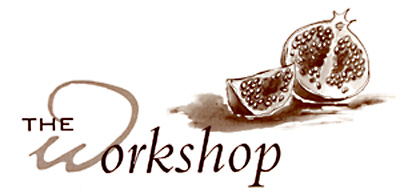 |
HARVESTING KNOWLEDGE AND EXPERIENCE |
THE FROM FARMER TO PLANNER AND BACK: Harvesting Best Practices workshop represented the mid-way point in a long process of testing methodologies for involving rural women and men in agricultural development planning. It grew out of preparations for the Fourth World Conference on Women when FAO's Women in Development Service provided funds for national committees to prepare sector reports on the situation of rural women to include in the national reports each country was required to prepare for the Conference.
A review of the reports found several constraints to improving the situation of rural women that were common to every country. All of the reports recognized that there is very little gender disaggregated data and information available to planners and policy-makers. Moreover, rural people are rarely involved in planning processes and thus planners and policy makers do not know what women's and men's most pressing problems are. There is a lack of formal mechanisms to inform planners of rural people's needs, or to create a space where rural men and women can express their views and participate actively in decision-making on how agricultural projects, programmes and policy are formulated and carried out.
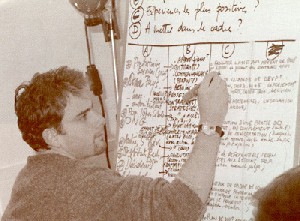 |
In an effort to fill these gaps and support local planning processes in which rural people - especially rural women - would have a voice, FAO launched pilot projects in Namibia, Nepal and the United Republic of Tanzania as part of an inter-regional project "Improving Information on Women's Contribution to Agricultural Production for Gender-Sensitive Planning", financed by the Government of Norway.
The goal was to improve communication channels among men and women farmers, extension agents and planners by using participatory research and supporting consultative planning processes. This required training planners and extensionists to work in a participatory manner with rural people, to help them solve problems of food insecurity and rural underdevelopment.
More than 200:
flip chart sheets were produced by the participants who enjoyed the opportunity to work informally within small groups.
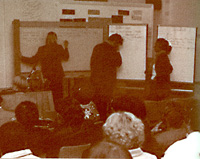 |
The challenge was how to communicate field-based information about rural peoples' needs to the planners. The microlevel processes and gender relationships had to be made visible to planners at all levels, with the expectation that such information would influence how they think and, more importantly, how they set policy and plan interventions.
As the three projects got underway, useful lessons began to emerge. These were among the first FAO projects that tested gender-sensitive participatory rural appraisal (PRA) and explored how to set up mechanisms for needs-based planning processes. In order to evaluate these experiences, the Women in Development Service organized the workshop to bring together nationals who had worked on the three pilot projects.
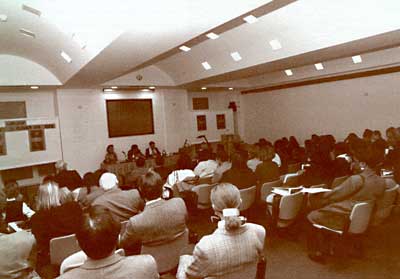 |
When the small
groups made their reports to the plenary, their words and thoughts were simultaneously recorded in three languages on flip charts by the facilitators. This allowed for easier compilation of participants' ideas about best practices so that their collective knowledge could be used to develop the global participatory and gender-responsive agricultural development (PGRAD) planning framework, known as The Responsive Planner.
While planning the workshop, the Service discovered that other FAO pro-jects were experimenting with similar issues of gender, participation and planning. It was obvious that representatives of these other projects should also participate in the workshop. As a result, with the benefit of funding from the Government of Norway, the workshop was able to invite field staff from 12 FAO projects to come to Rome to discuss and share their experiences. The Service also asked staff of 11 of the projects to prepare case studies looking at the lessons learned, describing how project staff conducted participatory planning and/or describing their efforts to make planning procedures more responsive to gender and other differences among farmers. The case studies analysed several challenges to gender-sensitive and participatory planning such as entry point, tools, capacity-building, linkages and institutionalization of the approaches.
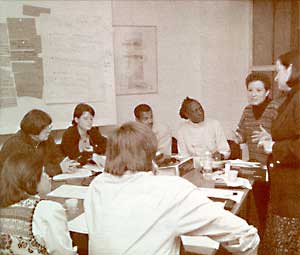 |
Twenty field staff
from the FAO projects participated along with 15 staff members from the Women and Population and other FAO technical divisions, as well as international consultants who had been involved in the projects and had written the case studies. The field participants had an average of ten years of hands-on practical experience. It was a week-long blending of working groups and plenary meetings.
The Key Issues paper, written as a synthesis of ten of the case studies, reviews and analyses the lessons learned and places them in the context of the larger planning picture.
Gender and participation are two ideas that have been used in development processes around the world for more than two decades. Each has generated new ways of thinking and working, in consequence of which there is now a wealth of literature and a vast array of methods, all aimed at achieving similar goals of social inclusion and empowerment.
Yet it is only recently that gender analysis and participatory development came together. And as was seen by the enthusiasm of the participants at this workshop, gender and participation make a powerful team. The problem is that rhetoric has run far ahead of meaningful application.
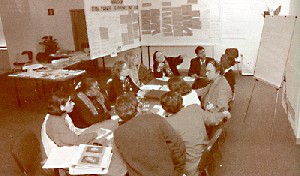 |
The working
group sessions were facilitated by FAO staff members. The overall task of the FAO projects was to involve rural women and men in agricultural planning processes. But the specific objective of the workshop was to provide the opportunity for participants to share their experiences with others working in similar situations and facing similar constraints, and to use that information to develop a framework that would provide a guide to planners.
There have been several years of exploration and experimentation with plenty of failures. But, as FAO and these workshop participants recognized, there has also been a rich harvest of successes.
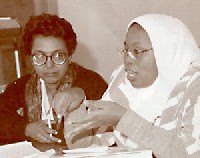 |
Simultaneous translators
also joined the group sessions, to allow the participants to express themselves freely. This resulted in a very positive geographical mix at each table where global experiences could be shared.
It is imperative that both the successes and failures be recognized and used as a basis for further progress. Understanding gender issues is fundamental to understanding the overall equation for food security. Building on the knowledge and experiences of rural women and men when planning agricultural programmes and services has never seemed more promising than it is today. Gender-sensitive use of participatory tools and approaches not only provides useful information to agricultural planners, it strengthens women's voice in the planning process.
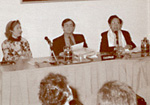 |
The discussions
sought answers to three central questions: How to conduct planning processes that fully involve both rural women and men? How to influence current planning procedures to make them more responsive to gender and other differences among farmers? How to get agricultural planners and field-based workers to respond to the priorities of different groups of men and women farmers?
With this workshop, gender issues, participatory methods and agricultural planning were given a unique venue. With this publication, The Key Issues are presented for further study or analysis and The Responsive Planner, the framework that grew from the workshop, will enable field workers and planners to share the harvest - a harvest of best practices.
The workshop
convened in Rome 8 to12 December 1997.
The participants came from FAO projects in the following countries: Namibia, Nigeria, Ethiopia, Senegal, Tanzania, Zambia, Nepal, India, Honduras, Costa Rica, Tunisia, Pakistan and Afghanistan. In addition, the Improving Household Food Security and Nutrition project in Luapula Valley in Zambia sent its National Project Director using its own funds, and the United Nations Development Programme (UNDP) sponsored a representative who had worked on the FAO Programme for Integrated Development of Artisanal Fisheries (IDAF) in West Africa. Unfortunately, representatives of the Afghanistan project and one participant from the Pakistan project were denied entry visas into Italy and were unable to attend. Although 11 case studies were prepared, The Key Issues paper only includes the findings from ten of the studies, because the study from the United Republic of Tanzania project was not available at the time the analysis was written.
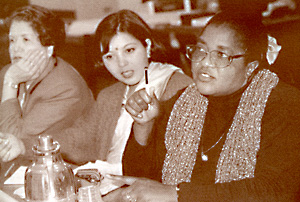 |
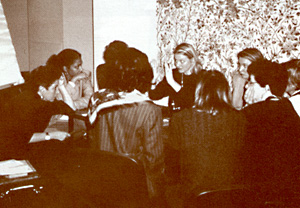 |
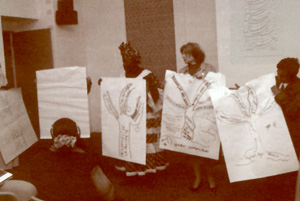 |
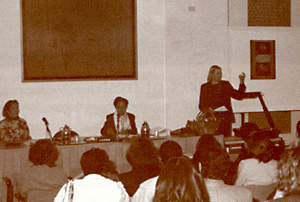 |
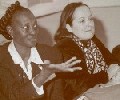 |
The best practices
brought to the meeting by the participants were harvested through: exercises to clarify the preliminary elements of the proposed framework; dividing into small groups with each assigned a different perspective to discuss (small-scale farmers, district-level planners and implementers, or national-level planners); and plenary sessions to integrate and share the working group findings.
 |
There were no
speeches from international experts. The aim of this workshop was to allow the participants to come up with their own answers. And they did.
The workshop had
scheduled time to plan follow-up activities in each country, but the participants were so enthusiastic with their unhindered three-language communication, they chose to continue their group work. They unanimously decided to postpone the follow-up planning until after the workshop.
A basket of fresh
pomegranates always in view to remind the participants of the theme of the workshop - Harvesting Best Practices.
 |